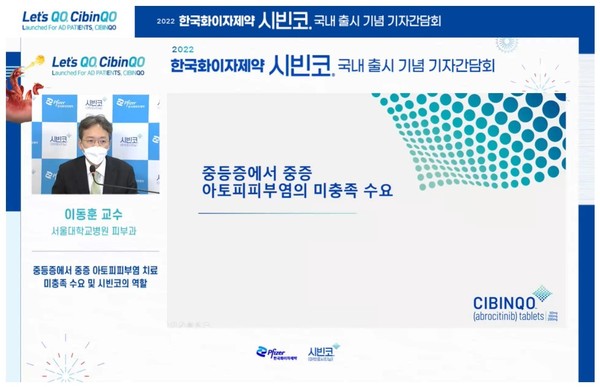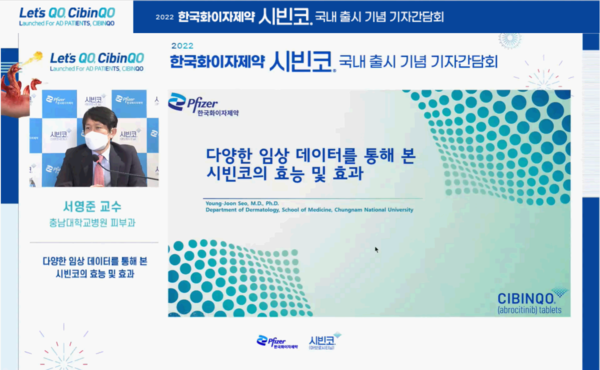Pfizer Korea aims to strengthen its position in the local dermatology market with the launch of its first dermatology product Cibinqo (ingredient: abrocitinib), a treatment for moderate to severe atopic dermatitis, the company said.
Cibinqo is a Janus kinase 1 (JAK1) inhibitor released in Korea on April 1.
It obtained approval for treating moderate to severe atopic dermatitis in adults and adolescents over 12 subject to systemic therapy at the end of last year.

"I expect Cibinqo to serve as an advanced treatment option for atopic dermatitis," Professor Lee Dong-hoon of the Department of Dermatology at Seoul National University said at a news conference Tuesday. "Advanced treatment options are treatments based on the etiology of atopic dermatitis."
Lee noted that Cibinqo's benefits include a wide range of dosages compared to other treatments.
"Cibinqo, which acts within cells that inhibit JAK1, has a 200-mg dosage recommended for most patients, 100-mg dosage for those over 65, 12-17-years- old, or patients with risk factors for adverse reactions or low tolerability, and 50-mg dosage for patients with severe renal impairment," Lee said. "It has increased treatment options for adolescent patients because the drug has received approval for treating moderate to severe atopic dermatitis for those over 12."
Lee also commented on the safety concerns over JAK inhibitors.
JAK inhibitors are under investigation from various health agencies on whether it increases the risk of cardiovascular events and cancer in autoimmune diseases because Pfizer's Xeljanz (Ingredient: tofacitinib), the first generation JAK inhibitor, showed a long-term safety problem.
"There is a difference between rheumatoid arthritis and atopic dermatitis," Lee said. "Rheumatoid arthritis itself has a cardiovascular risk. Rheumatoid arthritis patients often have comorbidities at an older age and frequent use of conventional immunosuppressants."
Therefore, Lee explained that he believes that the safety of JAK inhibitors has been evaluated under harsh conditions.
"In the case of atopic dermatitis, the age of the patients is low, and the number of comorbid diseases is small. Therefore, safety issues will unlikely be the same for atopic dermatitis," Lee said. "Also, the first-generation drug tofacitinib has a wide target range of JAK inhibition, while next-generation JAK inhibitors like Cibinqo selectively inhibit JAK."

Professor Seo Young-joon of the Department of Dermatology at Chungnam National University Hospital agreed, saying there was no significant difference in adverse events in the Cibinqo monotherapy and combination therapy compared to the placebo group.
"Cibinqo's large-scale clinical studies involved 3,128 patients. Seo said that there was no significant difference in adverse events compared to the placebo group, and the trial obtained similar results for combination therapy. "While a long-term study is still required for Cibinqo, there have been no adverse reactions that would raise concerns in the clinical data."
He added that the most common side effect was nausea, common to other JAK inhibitors.

